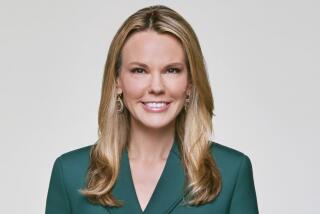UPBEAT MESSAGE TO TROOPS AT CBS NEWS FROM STRINGER
- Share via
NEW YORK — Howard Stringer began his first day as CBS News president on Thursday facing a list of pending items that include next week’s election-night coverage, CBS’ new morning-show effort and his division’s budget for next year.
But at a time when CBS Inc. still is making job cuts because of reduced revenue expectation, he had upbeat news for the troops at CBS News, where 144 persons have been laid off and another 70 jobs eliminated in two waves of cutbacks since September, 1985.
“I’m not expecting any more layoffs,” said Stringer. However, speaking in a brief phone interview before he went to work, he cautioned that next year’s proposed budget obviously still faces close scrutiny “to see if there are ways to continue to keep our costs down.”
The Oxford-educated executive became CBS News’ third president in 11 months on Wednesday when he was summoned to the office of acting CBS Chief Executive Officer Laurence A. Tisch and told he had the job.
He had been acting head of the 1,200-employee news division since Sept. 11, when his predecessor, Van Gordon Sauter, quit a day after a top-level shakeup in which CBS board chairman Thomas H. Wyman was ousted.
Stringer’s permanent appointment was generally well-received by staffers at CBS News, which during Sauter’s presidency and that of Sauter’s predecessor, Edward M. Joyce, had been beset by low morale and much-publicized dissension. The latter included public criticism this summer from “60 Minutes” humorist Andy Rooney when Sauter announced that the low-rated “CBS Morning News” was being dropped at the end of this year after 23 years on the air.
An 18-year veteran of CBS News, Stringer, 44, previously served as executive vice president to both Joyce--who left CBS in February this year--and Sauter, a two-term president of the division.
But Stringer made his mark as a producer, first with the “CBS Reports” documentary unit, then as executive producer of the “CBS Evening News,” where he was credited with helping Dan Rather overcome a shaky start in 1981 after Rather succeeded Walter Cronkite as anchorman.
Always considered the leading candidate for the CBS News presidency, Stringer nonetheless had campaigned for the job in various ways--seeking the support of key producers like Don Hewitt of “60 Minutes” and showing no timidity in making managerial and program decisions.
Although Stringer eliminated two CBS News vice presidential posts as part of a streamlining process under way throughout CBS, he rehired three respected veteran producers who had been laid off in the last wave of news cutbacks.
The latter move was seen as part of an effort by Stringer to restore morale that had been dropping ever since the cost-cutting layoffs began.
While still acting CBS News chief, Stringer sought and got approval for a so-called “instant” news special, a close-to-the-headlines AIDs documentary broadcast on Oct. 22.
(A month before Sauter’s resignation, Stringer was credited with instigating another short-notice news special that he helped produce--the high-rated “48 Hours on Crack Street” that aired on Sept. 2.)
Stringer, who was executive producer of “CBS Reports” programs from 1976 until December, 1981, said he’ll now try to get more prime-time documentaries--and two different kinds, at that--on the air in coming months.
“My enthusiasm for documentaries is documented, so to speak,” he said. “What I’d like to do . . . is to continue running documentaries on a kind of two-tier approach.”
One approach, he explained, would be a “long-range” documentary in which producers and correspondents are given plenty of time to research, report and edit a report on a subject that, while important, isn’t in the headlines.
He cited as an example this year’s “The Vanishing Family” by Bill Moyers. (Moyers has said he plans to return to public television next month, but Stringer still is trying to get him to change his mind.)
The other approach, the new news chief said, are the “instant” specials that report on “subjects that are cresting in the public interest.” Examples of that would be CBS’ recent crack and AIDS specials, he said.
Those kinds of documentaries are done quickly, he said, but what they lose in production values “they make up for in timeliness.
“And I think a lot of those are targets of opportunity that I’ll offer to the network regularly and hope that they can fight their way into the (prime-time) schedule--as the schedule allows.”
On the morning-show front, Stringer said, he expects to make an announcement within the next two weeks on the new anchors and format of the CBS News portion of the new show succeeding the “CBS Morning News” in January.
Plans for the new three-hour program call for the first 90 minutes to be produced by CBS News--from 6 to 7:30 a.m.
The final 90 minutes, primarily devoted to light features, celebrity interviews and the like, will come from a non-news unit headed by Bob Shanks, a former ABC executive who helped develop that network’s successful “Good Morning America.”
Stringer said he didn’t know yet what his entertainment-side counterpart has in mind for his half of CBS’ new effort against NBC’s first-in-ratings “Today Show” and ABC’s rival offering.
“I’ll be meeting with Shanks before the week ends,” Stringer said. “I’ve only met with him once since he arrived, so I’ve had no briefing yet on his plans.”
More to Read
The biggest entertainment stories
Get our big stories about Hollywood, film, television, music, arts, culture and more right in your inbox as soon as they publish.
You may occasionally receive promotional content from the Los Angeles Times.










